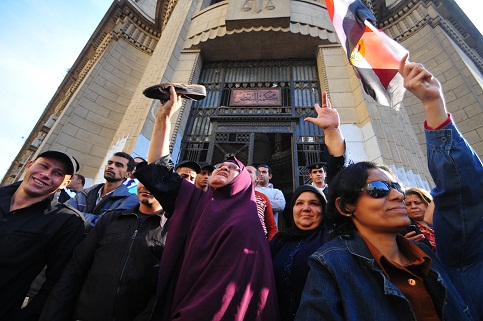By Marwa Al-A’asar
CAIRO: The Supreme State Security Court sentenced Thursday an Egyptian businessman to 25 years in prison on charges of spying for Israel.
Two Israeli Mossad intelligence officers were handed down similar sentences in absentia. Official spokesman of the Egyptian Interior Ministry Fouad Allam told Daily News Egypt that if the “two Israeli fugitives are currently located in Israel, they will never be handed in.”
The two men were identified in December 2010 as Idi Moshe and Joseph Demore.
Allam said the interior ministry could not comment on a judicial order. “The ministry is only in charge of putting the verdict into force … and arresting fugitives if they are present in Egypt,” he explained.
Tareq Abdel-Razek, who worked in the import-export business, was arrested in August and charged four months later along with the two Israelis for seeking to recruit agents in Egypt, Syria and Lebanon to spy for Israel.
According to the charges presented by the state security prosecutor last December, the three men were conspiring to seek out officials working in the telecommunication industry who might be amenable to supplying information to Israel. The charge list accused Abdel-Razek, of searching for suitable Syrian and Lebanese candidates who would then be approached by an Israeli operative in Syria.
He was also accused of trying to recruit younger Egyptians for information, and two telephone centers had been set up in London and Cairo to eavesdrop on conversations of Egyptian officials, which were later routed to a third center in Tel Aviv. According to state security prosecutor Hisham Badawi, Hassan was paid $37,000 for his efforts.
The three men were convicted of harming Egypt’s national interests as well as jeopardizing the country’s diplomatic ties with Syria and Lebanon.
The first hearing was held on Jan. 15. The court said in the verdict that the trial sessions were held behind closed doors in order to “maintain Egypt’s national security and that of other fellow Arab countries.”
According to senior researcher at Al-Ahram Center for Political and Strategic Studies Abdel-Aleem Mohamed, “The verdict derives a double message; that the Egyptian state currently has a strong presence and that will not complement Israel and engage in negotiations [over espionage cases] like the former regime.”
“Israelis have to understand that they are now dealing with a new state having power to take drastic decisions about its national security,” he told Daily News Egypt.
Egypt and Israel signed a peace treaty in 1979, which stipulated a state of normalization between the two countries following years of war. Some political forces and activists have recurrently called for reviewing the peace agreement, while others demanded an end to bilateral relations to object to Israeli aggression against Palestinians in the occupied territories.
On June 12, the Egyptian authorities detained a dual US-Israeli national named Ilan Grapel charges of conducting espionage activities, attempting to ignite strife between citizens and the army as well as stir sectarian tension. He was remanded in custody pending further investigation.
The two espionage cases might stir tension with Israel, which saw some recent decisions taken by the ruling Supreme Council of the Armed Forces as worrying.
Egypt has recently eased restrictions on the Rafah border crossing to allow Palestinians in the Gaza Strip to pass through six days a week. Also in May, the government sponsored a reconciliation agreement between the two rival Palestinian factions Fatah and Hamas, which Israel condemned. Egypt’s proclaimed determination to review the contract regulating exporting natural gas to Israel may have also stirred further tensions between the two states.
The Israeli Ambassador to Egypt, meanwhile, declined to comment on Thursday’s verdict.
“The Israeli side is probably reviewing the situation carefully now. Coming up with an official at this stage may further stir more tension… which is not in their favor,” Mohamed said.
Under the rule of ousted president Hosni Mubarak, who Israel considered a valuable ally, Egypt arrested a number of people accused of spying for Israel.
In 2007, Egypt convicted a 31-year-old Egyptian-Canadian dual national of spying for Israel. Three Israelis were charged in absentia. Israel dismissed the case as a fabrication.
In 1996, Egypt sentenced Azzam Azzam, an Israeli Arab textile worker, to 15 years in jail for spying for Israel. Egypt said Azzam had passed messages in women’s underwear using invisible ink.
Both Azzam and Israel denied the charges. He was released after serving eight years as part of a deal that included the release of six Egyptian students detained in Israel. –Additional reporting by Agencies


